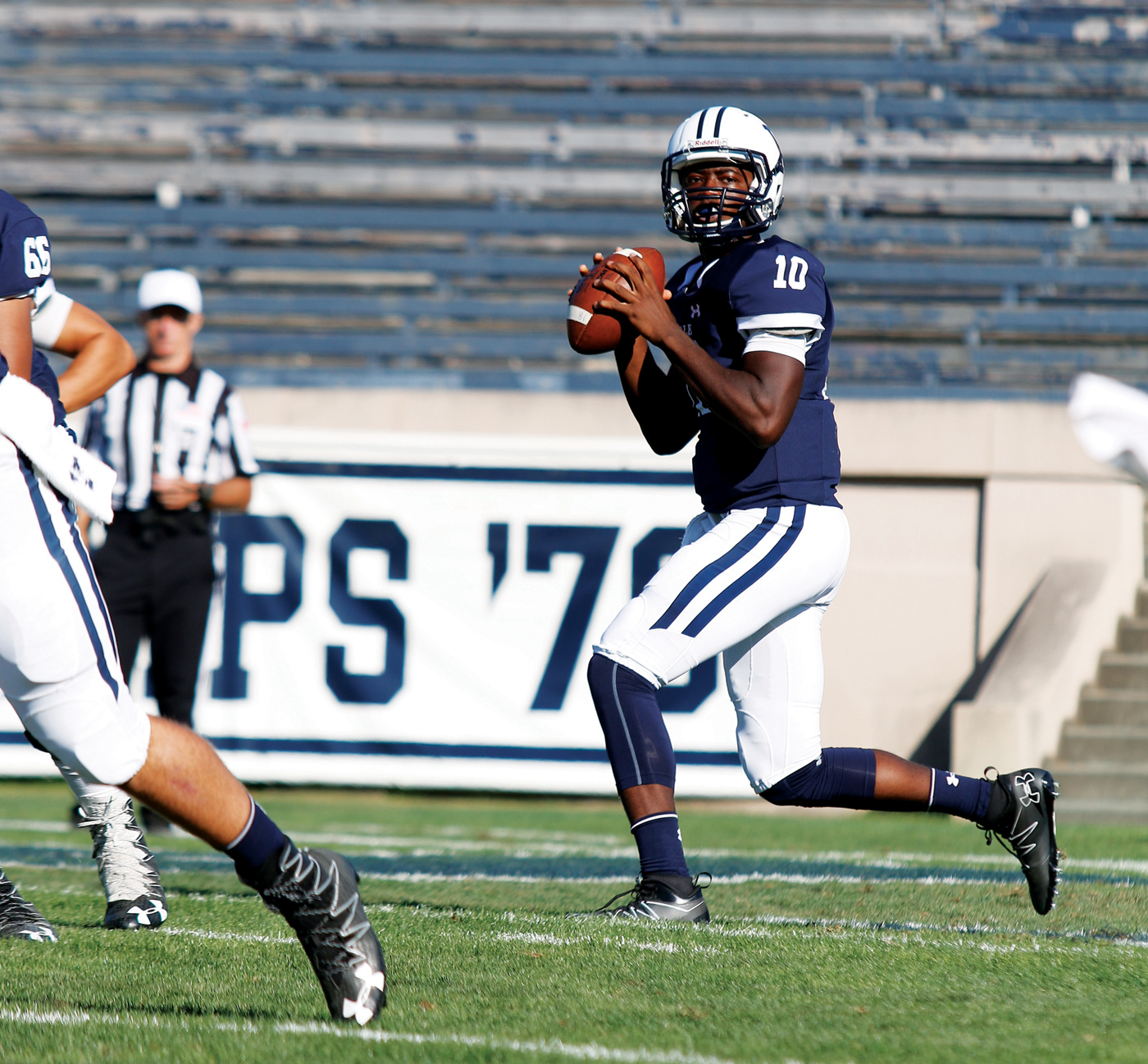
At the battlefield of Gettysburg in 1863, a war-weary America needed leadership. There was no end in sight of one of the bloodiest conflict in the country’s history. People had all but lost the meaning of the war amidst the carnage.
With 272 words, Abraham Lincoln seemed to change that.
The rising seniors on the Yale football team will not face as demanding a burden as Lincoln did when they aim to lead Team 145 toward an Ivy League title after a 3–4 conference finish in 2016. Nevertheless, the Bulldogs drew inspiration from the 16th president’s leadership on a weekend retreat to the Pennsylvania battlefield.
Led by former Gen. Stanley McChrystal, the current junior class toured the battle sites and developed its team culture 23 weeks before the season opener.
The Gettysburg trip has become a yearly tradition under head coach Tony Reno. While off campus for barely 24 hours, the rising seniors learn about leadership both on the field and in their lives with the former commander of United States forces in Afghanistan.
“I admire the way in which [McChrystal] is able to command a room simply through his presence,” 2017 captain and cornerback Spencer Rymiszewski ’18 said. “McChrystal is so calm and poised yet incredibly assertive and confident at the same time. He demands respect from all those around him without having to say a word. He is an amazing person, and as a team we were honored to have the opportunity to learn from him.”
After retiring from the military, where he served for 34 years, McChrystal was named a senior fellow at the Jackson Institute for Global Affairs. The general teaches a highly sought after graduate seminar on leadership, which 2016 captain and linebacker Darius Manora ’17 has taken and in which linebacker Matthew Oplinger ’18 is currently enrolled.
“McChrystal’s class is one of the best I’ve taken at Yale,” Oplinger said. “It’s an in-depth look at different leaders and different styles of leadership in different situations.”
Among the many leaders featured in the course, Lincoln and Martin Luther King Jr. are two of McChrystal’s favorites, according to Oplinger.
McChrystal’s relationship with the Yale football team began when the general gave a lecture to the entire team in Reno’s first year as head coach. As Reno looked to start a leadership program as part of an effort to shape the team culture, the first-time head coach turned to McChrystal. According to Reno, the two met at least a dozen times over the next year to develop the program. The four-year leadership curriculum, which focuses on leadership in both the classroom and on the field, is highlighted by the rising seniors’ trip to Gettysburg.
“If you go to Yale, you’ll be asked to lead somehow in your life,” Reno said. “You’re going to a university that produces the leaders of the world.”
On Friday night, the players dine with McChrystal and other military officers who worked under him. Manora said that these conversations allow high-ranking officers to impart wisdom on the incoming senior class.
McChrystal then takes the team on a Saturday morning run through the different battlefields of Gettysburg. The 62-year-old general has no trouble keeping up with the Division I athletes — Manora noted that McChrystal is probably “the most conditioned person on that run.”
Pulling from his immense knowledge of military history, McChrystal breaks down the different battles as they run by different sites and asks players to put themselves in the shoes of those who fought. Manora said McChrystal emphasizes the battles as a conflict between two teams and explains the qualities of each individual leader in the two armies.
Oplinger pointed out that like generals in a battle, athletes have to distinguish between times in which they have to step up and those when it is better to trust their teammates. The linebacker also noted that while athletics cannot be compared to the sacrifices of war, there are some similarities in mentality: Like defensive players who put their complete trust in their team’s offense, soldiers at Gettysburg had to trust in their compatriots who were fighting at other sites.
Safety Hayden Carlson ’18 said the trip allows the team to unplug and build the trust that McChrystal emphasizes for cohesive teamwork.
“The trip is a great way to build team camaraderie,” Carlson said. “The best part was spending more time with seniors in the class and learning more about other guys on the team I didn’t know as well.”
Beyond the interclass trust, the trip allowed the seniors to develop the team culture for the coming year, which then permeates down to the underclassmen. According to Oplinger, the senior class not only dictates the culture of the team in its final season in New Haven, but also sets the tone for years to come.
Manora believes that his senior class’s decision in Gettysburg to commit completely to the team helped propel the Bulldogs to their first victory over Harvard since 2006. Winners of just two of nine games heading into the season finale and facing a league-leading Harvard squad, Manora credited the team’s mental strength formed in Gettysburg with propelling Yale to victory.
Both Manora and Reno have relied on McChrystal during their times as captain and coach of the Bulldogs. The current senior believes the most valuable lesson he has taken from McChrystal is the ability to bring people with different perspectives together and treat everyone he leads with the same level of respect regardless of title. And for Reno, McChrystal is “a great mentor” and “the most inspiring, impressive person [he has] ever met.”
The respect runs both ways, as Manora described McChrystal as “a huge supporter of Yale football.” According to Manora, the general attends several games every year and often addresses the team as a whole.
Yale opens the 2017 season on Sept. 16 when the Bulldogs visit Lehigh.







